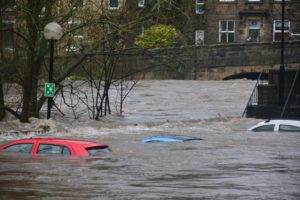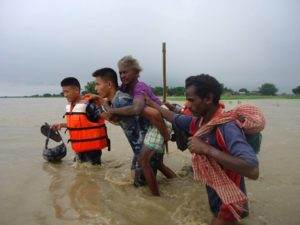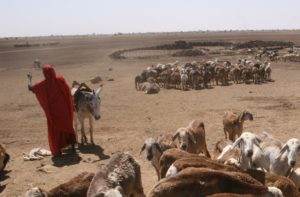While people living in the world’s richest countries prepare for the future impact of climate change, the lives of people in the developing world are already being shattered by it. Climate change is exacerbating poverty in the world’s poorest places. And those most at risk are the least to blame.
Climate change is affecting people in every country in the world. Extreme weather events such as floods and droughts are becoming more frequent and more intense. They are destroying lives and livelihoods, driving people from their homes and threatening the food supplies of whole communities.
A human crisis
Rich countries are not immune to climate disasters. The increased flood risk in parts of the UK is the result of rising sea levels and heavier rainfall caused by the changing climate. 818 properties in England have been affected by the most recent floods. Schools have been shut, roads closed, trains cancelled and whole communities cut off from the rest of the country.
 Meanwhile, the hotter, drier climate in Australia is making bush fires an increasingly serious threat to people, the economy and the environment. So far, four people have died in this month’s fires, which are feeding off drought-stricken farmland and bush. At the time of writing, crews were still battling about 120 blazes across New South Wales and Queensland.
Meanwhile, the hotter, drier climate in Australia is making bush fires an increasingly serious threat to people, the economy and the environment. So far, four people have died in this month’s fires, which are feeding off drought-stricken farmland and bush. At the time of writing, crews were still battling about 120 blazes across New South Wales and Queensland.
At a time when people everywhere are feeling the effects of the climate crisis, it’s those living in the world’s poorest places who are the most vulnerable. In particular, the 2.5 billion smallholder farmers, herders and fishers who depend on natural resources for their food and income.
As a direct result of the climate crisis, millions of the world’s most vulnerable people living in poverty are sinking deeper into it. People who were surviving on the brink of poverty are being pushed into it. And many who had escaped it are overwhelmed by it all over again.
The human impact is loss, conflict and hunger. And it’s people who are already living in poverty, and who have contributed the least to the climate crisis, who are suffering the most. Join us as we shine a light on the human impact of the new planetary reality – and discover the holistic, human-centred solutions that are key to turning the tables on climate change.
“Saving our planet, lifting people out of poverty, advancing economic growth… these are one and the same fight. We must connect the dots between climate change, water scarcity, energy shortages, global health, food security and women’s empowerment. Solutions to one problem must be solutions for all.”
Ban Ki-moon, former Secretary-General of the United Nations
Living in fear in Nepal

Floods affect more people globally than any other type of natural hazard. The poorest communities suffer most as repeated disasters undermine their potential to develop and trap them in a cycle of poverty. Flood risk is increasing as climate extremes and erratic rainfall patterns put more people in harm’s way.
Millions of people in Nepal live in fear of rising flood waters during the monsoon season. They face increasing flood threats as the changing climate makes precipitation more severe and weather patterns more erratic. With limited warning time, in some cases as little as two minutes, people only have time to grab their children and run. Living here, each day is a roulette game where your very existence is at stake.
“South Asia is no stranger to climate stress and extreme weather events, but climate change is adding even greater threats to human health, food security and livelihoods. In human terms, the outcome is whole communities of people living in fear of being swept away by floods, even as they struggle to feed themselves and make a living from the land.”
Sunil Acharya, Practical Action’s climate and resilience adviser in South Asia
The conflict threatening Sudan’s fragile peace

Conflict is a central reason for poverty and human suffering – and climate change is one of the root causes. It leads to food shortages, it threatens people’s livelihoods, and it displaces entire populations. By intensifying existing environmental, social and economic challenges, climate change increases competition over resources. It can also intensify existing tensions between communities.
Sudan is one of the most drought-prone countries in Africa. In the area of North Darfur in particular, climate change has worsened the cycle of prolonged droughts and flash flooding. Growing crops and raising animals has never been tougher – farmland is literally turning into desert in front of people’s eyes. Consequently, less food is produced, food prices are higher and competition for both land and water is intense. People who just want to live in peace are forced into conflict with their neighbours – there just isn’t enough to go around.
“Following the civil war in Sudan, communities are entering yet another disaster. Climate change is tearing families apart and ruining lives in North Darfur. The land here is so depleted by drought it can’t support the human population – but the people who live here have nowhere else to go. It’s a situation that inevitably forces them into conflict with each other.”
Awadalla Hamid Mohamed, Practical Action project manager in Sudan
Farmers in Peru struggle to feed their families
 As the planet gets warmer, agriculture and food supplies are increasingly erratic, while floods and droughts brought on by climate change make it harder to produce food. This makes farming more difficult and pushes up food prices. 75% of the world’s poorest people live in rural areas and depend on farming for their livelihood. For these people, the effects of climate change — unpredictable weather, changes in temperature and rainfall, shrinking water sources and more competition for resources — really are a matter of life and death.
As the planet gets warmer, agriculture and food supplies are increasingly erratic, while floods and droughts brought on by climate change make it harder to produce food. This makes farming more difficult and pushes up food prices. 75% of the world’s poorest people live in rural areas and depend on farming for their livelihood. For these people, the effects of climate change — unpredictable weather, changes in temperature and rainfall, shrinking water sources and more competition for resources — really are a matter of life and death.
Coffee production is the economic engine of many tropical countries, with millions of people depending on coffee farming and related activities. Despite the economic importance of the crop, being a coffee farmer in Peru or Bolivia is a constant struggle due to the impact of climate change. Variability in temperature and rainfall result in severe crop plagues and changes to the ideal coffee ecosystem. This turns many areas of conventionally farmed coffee into unproductive and dying land. More frequent and more severe floods and droughts, damage crops and cause soil damage
As a result, many farmers struggle to feed their own families. Some resort to moving to higher forested land, using destructive farming practices that aren’t sustainable and damage the environment even more.
“In remote areas of Peru and Bolivia, farmers are finding it increasingly difficult to make a living. They are cut off from the technical information and support that might help them. Climate change is driving families apart. Poor harvests and lack of alternative income sources force farmers to leave their families to look for work in the cities or on bigger farmlands.”
Carlos Rueda, Practical Action’s agriculture lead in Peru
From vulnerability to resilience
Around the world, Practical Action is helping millions of people adapt to climate change so that they can prosper despite the challenges it creates. We focus on where there’s greatest need and we can make the biggest difference. We start by working with communities to identify the specific challenges they are facing, then develop solutions that achieve the biggest impact. We scale up these solutions so that more people benefit. And we share our experience and expertise to create impact far beyond our projects.
“Resilience is central to Practical Action’s philosophy. At a time when there is much talk of ‘fighting’ the climate crisis, we are also helping people ‘face’ it and to survive and thrive in the new climate reality. We’re making resilience a way of life for millions.”
Helena Molyneux, Chair of Practical Action.
As the people we work with in Nepal, Sudan and Peru already know, climate change is a problem of the present, not just the future. It will take ingenuity, boldness and collaboration to turn the tables.